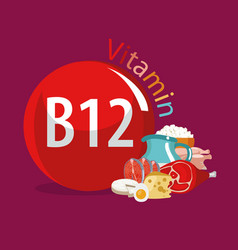
Vitamin B12 is important
We all need vitamin B12 for it creates nerves, DNA and all important red blood cells. The best way to get Vitamin B12 is from food. This is especially important because the body does not make Vitamin B12 so you have to supplement and/or eat to get the recommended amount of 2.4 micrograms a day.
Good food sources include the following:
Notice the foods listed above are all animal products, hence, people who are vegans may be more susceptible to Vitamin B12 deficiency unless they consume fortified products such as:
Read the labels of the above food choices because not all brands have Vitamin B12 fortification.

Vitamin B12 is important
Consuming Vitamin B12 from food is the best source. However, there are some people who 1) don’t consume enough vitamin B12 to meet their needs and yet others that 2) can’t absorb enough even if they take sufficient amounts of Vitamin B12. Many in the population have Vitamin B12 deficiency and the tendency is that the deficiency risk increases with age.
Cleveland Clinic publishes the following data on Vitamin B12 deficiency:
Approximately 1.5% to 15% of people have vitamin B12 deficiency. Here are the percentages of people who have vitamin B12 deficiency based on age ranges:
What are some symptoms of Vitamin B12 Deficiency?
Deficiency of this vitamin may present itself as shortness of breath, tingling/numbness of extremities, constipation, paranoia, and irritability. B12 deficiency can also be developed over time, and may present only a few or all symptoms. It is often overlooked to diagnose as symptoms presented can resemble other diagnoses, and if left untreated it could cause irreversible damage. The optimal amount of B12 you should be getting daily is somewhere around 2.4 micrograms, and it can be found naturally in animal products such as dairy, fish, eggs, and fish (see list above). For this reason many vegetarians and vegans are deficient in B12.
Even those older adults that consume plenty of Vitamin B12 can lack sufficient amounts because the production of stomach acid reduces with age, which makes it more difficult to absorb B12. Certain medications like omeprazole and ranitidine can also affect B12 levels. Autoimmune disorders like pernicious anemia, usually present themselves in people over the age of 65, and is one of the most common causes for severe Vitamin B12 deficiency.
If you believe you are suffering from any of the symptoms related to deficiency, you can check your Vitamin B12 levels through a simple blood test that you order online at HealthOneLabs.com. If your blood test determine you don’t have sufficient amount of B12, you can speak to your physician about possibly taking a B12 supplement. Your doctor will help you determine the best dosage for you depending on the extent of your deficiency. Always check with your physician prior to taking vitamin B12 supplements.
Order your own blood lab tests online – save time, money and take control of your health. We provide the doctor’s order as part of our service. Order your lab tests today!
